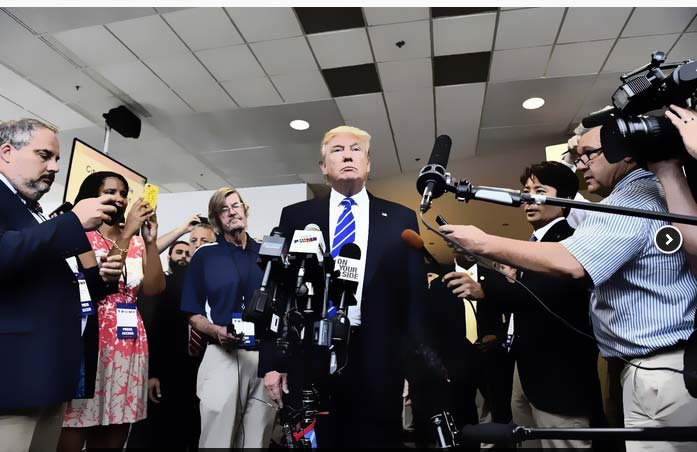
Donald Trump isn't the carrier of the disease that threatens the language, but he suffers with enthusiasm. His abuse of the adjective might eventually threaten his foreign policy.
Nothing is ever merely "good," or "fortunate." No appointment is merely "outstanding." Everything is "fantastic," or "terrific," and every man or woman he appoints to a government position, even if just two shades above mediocre, is "tremendous." The Donald never met a superlative he didn't like, himself as the ultimate superlative most of all.
Hyperbole is the affliction of our age, where life is lived on the surface, entertainment is all and synthetic excitement is as good as the real thing. Why end a sentence with a period, when you can use an exclamation point, or even two? Or three. Few exclamation points come into the lives of most of us, and even though being the president is naturally semi-exciting, life even for him is rarely "tremendously exciting." A visit from the prime minister of Japan or Canada, or the third visit of the day from Steve Bannon, doesn't quite qualify.
George Condon of the National Journal went through the transcripts of several of the president's meetings with world leaders, and masochist that he is, counted 78 adjectives the president used in his descriptions - words like great, tremendous, fantastic, incredible, special, wonderful, terrific and big. Nothing wrong with any of them, used with care, precision and infrequency.
But even a president - indeed, even President Donald J. Trump - does not live in a world where everything is wonderful, tremendous, fantastic and incredible. He could mislead or confuse a prime minister, as when he said he was working on a peace deal for the Middle East that would be the best in the history of that godforsaken place.
"There are certain things you don't do as a world leader," a certain world leader told Mr. Condon. "One of them is that you don't raise expectations because then you are going to be held accountable to those. He set a very high bar, saying this is going to be the best peace deal ever. He's raised expectations that will be very tough to meet."
Good advice, no doubt. But perhaps this certain world leader should save his advice for another president. This president's bubbling enthusiasm, for himself first and then for whoever he may be talking to, just can't be contained. His audience, here and in the rest of the world, just has to get used to it, and every man must learn for himself to discount the hyperbole and tune out the adjectives. Besides, who's to say when he might make some of them come true.
Dizzy Dean, the great St. Louis Cardinals fireballer with an ego the size of the Donald's and who spoke a kind of Ozarks braggadocio, was once chided for talking too much about what a great pitcher he definitely was. "Well," he said, "it ain't braggin' if you can do it." That applies to presidents as well as Hall of Fame pitchers, and the Donald has got the braggin' part down to the ground.
The president is not a writer, but a talker, and talkers use words as a mechanic's tools. The spoken word is cheap. You don't have to be thoughtful or even coherent to make your point in the spoken word. That's the difference, or it was once, between newspapers and television.
The Donald brings to the Oval Office the unconventional background of a salesman and a dealmaker. He uses hyperbole as a tool. If it works, he keeps using it. If not, he drops it and picks up another Crescent wrench or screwdriver.
Politicians and diplomats in the rest of the world are clever ladies and gents, and they will learn to measure his bubbling enthusiasm. He's in an unfamiliar place, too, but things will shake out, as they always have. One thing the rest of the world will learn is that if you don't like what the Donald's selling today, hold that thought. Tomorrow is on the way.
He once dismissed Mexicans as "criminals" and "rapists," and hurt feelings that will require months to effectively soothe. But wait. Maybe he didn't mean it. Now he calls Mexicans "great," and says "I love the Mexican people." He spoke sharply about Japan, as if he wanted to reconsider the peace treaty.
But wait again.
He didn't mean that, either. He took Prime Minister Shinzo Abe to Mar-A-Lago for the weekend and treated him to a round or two of golf. Now they're friends forever. Getting a tee time in Tokyo is difficult even if you're a prime minister, and the Donald treated him to an entire golf course.
Comment by clicking here.
JWR contributor Wesley Pruden is editor emeritus of The Washington Times.


 Contact The Editor
Contact The Editor
 Articles By This Author
Articles By This Author